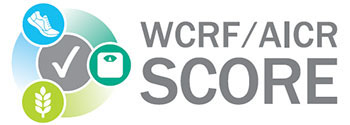
On this page...
Score Participants and Approach
Researchers at the National Cancer Institute (NCI) formed a collaborative team to address the challenge of creating a standardized scoring system that could be operationalized globally. The team included researchers from the American Institute for Cancer Research (AICR), World Cancer Research Fund (WCRF) International, and Barcelona Institute for Global Health (ISGlobal). Together they developed the preliminary scoring approach and justifications. The WCRF/AICR Continuous Update Project Expert Panel reviewed the scoring system to ensure that the scoring was consistent with the interpretation of the evidence on which the Recommendations were based and the intent of the Recommendations. Additional international researchers reviewed the proposal and provided feedback on the scoring approach.
Creating the Score
The goal was to create a simple and consistent scoring system with each included recommendation given equal weighting. Eight of the ten Cancer Prevention Recommendations![]() are included in the Score.
are included in the Score.
- Two recommendations addressing dietary supplements and cancer survivors are not included in the Score
- The recommendation to not use dietary supplements for cancer prevention and consume nutrients through food alone is largely addressed through the other five dietary recommendations.
- The recommendation specific to cancer survivors to follow the Cancer Prevention Recommendations after a cancer diagnosis was also excluded because it would be derived from a composite measure of the other components of the Score and would double-count the impact of adherence.
- Past scoring approaches were reviewed
To develop the scoring approach, a literature review was conducted to examine and compare the scoring approaches developed in previously reported studies examining adherence to the 2007 WCRF/AICR Cancer Prevention Recommendations.- The most commonly considered approaches were binary (1 vs. 0 points for meeting or not meeting each recommendation) and three level (1, 0.5, or 0 points for meeting, partially meeting, and not meeting the recommendation, respectively).
- A three-level scoring system was chosen for the 2018 WCRF/AICR Score, given that partially meeting a recommendation may confer some benefit.
- Score cut-point values were defined based on current evidence
Various factors were considered for defining the cut-points for scoring adherence to each recommendation.- The 2018 WCRF/AICR Score utilized all quantitative values that the 2018 WCRF/AICR Third Expert Report
 explicitly stated for defining the cut-points for scoring adherence to each recommendation.
explicitly stated for defining the cut-points for scoring adherence to each recommendation. - Where the text of the 2018 Cancer Prevention Recommendations did not provide explicit cut-points, guidelines from other authoritative organizations were reviewed, such as the World Health Organization (WHO) and the Centers for Disease Control and Prevention (CDC), for guidance.
- Additionally, the precedent available from earlier scores developed to align with the 2007 WCRF/AICR Cancer Prevention Recommendations were reviewed and considered.
- Lastly, where limited guidance was available for specific cut-points, particularly in relation to the fast foods recommendation, a literature search was conducted to identify and assess existing published categorization approaches.
- The 2018 WCRF/AICR Score utilized all quantitative values that the 2018 WCRF/AICR Third Expert Report